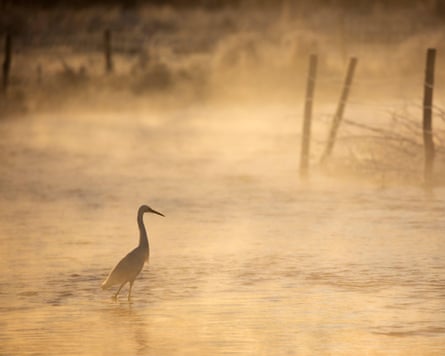Keir Starmer’s planning bill will “push the public towards Reform”, a Labour MP has said as he urges his colleagues to back amendments to the legislation.
Chris Hinchliff, MP for North East Hertfordshire, has submitted a package of amendments to the bill, which as it stands, lets developers “pay cash to trash nature”, he said. These will be debated in parliament during the report stage in early June.
One of his amendments, to protect chalk streams, was rejected by the government this week. A growing number of backbenchers are becoming concerned and angry about the bill, with Clive Lewis and Terry Jermy among those supporting amendments to strengthen protections for nature.
Labour’s plan to build 1.5m homes by 2029 will, it believes, be expedited by passing the planning and infrastructure bill, which is at its committee stage in parliament. The government argues that the proposed legislation will speed up housing developments and large infrastructure projects by allowing developers to avoid meeting environmental obligations to protect habitats and species such as barn owls, otters, bats and newts, at the site of their project. Instead they will pay into a central nature restoration fund (NRF) that will be used to create environmental improvement elsewhere.
But there is growing concern about the impacts of these plans, with government officials admitting this nature improvement could be carried out in a different county to where a building project is taking place. Pretty much every nature and environment group in England has objected to the bill as it stands. The National Trust, RSPB, and the Wildlife Trusts have said the proposed legislation puts rare habitats at risk and does not give any kind of baseline on which to measure environmental improvement.
Hinchliff told the Guardian that these changes meant Labour would be “fighting communities, kicking and screaming”, adding: “All that will do is push, push the public towards Reform and that politicians aren’t interested in what they think and what matters for their local community.”
His amendments include changing environmental delivery plans, so environmental improvement is guaranteed before development begins rather than after it finishes; having targets for socially rented home delivery; and giving people the right to appeal decisions on developments they think are harmful to the local area.
Hinchliff’s proposals have made him unpopular among some commentators. He has been accused of being part of “hedgehog Hezbollah” and is constantly called a “nimby” for suggesting amendments to the bill.
But he rebuffed such labels, saying: “No, I don’t think I’m a nimby. There are housing developments in my town just around the corner from me that I think are quite sensible. We’ve got a town in my constituency that is due to double in size, and I’m not opposing that.”
Taking on the government like this might make him unpopular, but Hincliff shrugged. “If it makes me less popular with the government, it makes me less popular with the government,” he said.

The bill allows for developers to potentially damage irreplaceable habitats such as chalk streams and pay for them to be offset with nature elsewhere. But nature experts argue that chalk streams cannot be replaced as they are unique and rare ecosystems that only arise under certain conditions.
“There’s a lot of chalk streams in my constituency. They’re one of the things that residents really care about and love about the constituency that we live in,” Hinchliff said.
“One the reasons why I tabled that amendment is because some habitats are irreplaceable, and it’s important that we protect those from damage, because you can’t just give developers the right pay cash to trash nature like that.”
That amendment was rejected on Wednesday by the Labour MPs on the parliamentary committee examining the draft law.
On the same day, the government admitted in its risk assessment of the bill that there was very little evidence that nature protections blocked developments.
Removing these protections on this basis was “dangerous”, Hinchliff said. “Many habitats are on the brink. Species are on the brink. And if we allow harm and pollution to go ahead on the proviso that in the future, will have a pot of money and will make things better those ecosystems will be functionally dead in many instances, if we’re not careful.”
He added: “When I read our manifesto, I took away from that very clear message that we were going to deliver the housing that the country needed in tandem with protecting the environment.”
Hinchliff has been alarmed by criticism of the bill by the Office for Environmental Protection and Sir Partha Dasgupta, professor emeritus of economics at the University of Cambridge.
Hinchliff said some Labour colleagues had come on board with his campaign, and there could be a sizeable group of rebels: “It’s a hugely political issue that matters to an awful lot of people, and I think my colleagues will feel the heat on this. I’ve been really pleased with the level of support I’ve received. I’ve had a good number of colleagues get back to say that they’re willing to support my amendments,” he said.
Despite potentially being out of step with the party leadership at present, which has said it backs the “builders” rather than the “blockers” and prioritises homes over bats and newts, Hinchliff said he was standing up for traditional Labour values.
“What I’m standing up for is a long and proud tradition of Labour values and that people from across the Labour movement have fought for for generations,” he said. “Let’s not forget, it was the Labour government which created the greenbelt, Labour politicians who created our national parks. These are all Labour traditions, and I’m hoping that I can persuade my party to look closely and seriously at the proposals I’ve put forward.”

.png) 4 hours ago
4
4 hours ago
4

















































